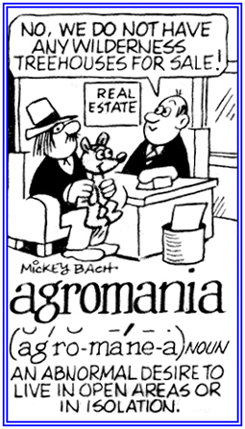agro-
(Greek: land, soil, field, fields; earth; wild, as one who lives in the fields; wildness; savage, savageness)
Additional details regarding agrogeological fertilization
By adding rock dust as a complete plant fertilizer along with plant matter, the soil may be much healthier.
- Rock dusts contain most of the nutrients essential for growth except for nitrogen and phosphorous.
- The release of nutrients is directly related to weathering, therefore their beneficial effect could last for many years before needing replacement, and even longer if used in conjunction with sustainable farming techniques.
- The problem of nutrient leaching is minimized as plants take up the nutrients at the same rate as they are being released, and there is also a minimal problem with toxicity from an oversupply of nutrients.
- Some dusts raise pH, countering the effects of soil acidity often found in certain soils.
If the soil is healthier then the plants will be healthier. Mixed rock dust can provide a full spectrum of minerals to the soil and this improves cellular structure, which could explain why rock dusted plants are more resistant to insect attacks and diseases.
It has been noted that the use of rock dust can reduce (or even replace) fertilizers, pesticides, fungicides and herbicides.
Expanding the understanding of agrogeology
Agrogeology is the study of the natural fertilization that takes place when weathering breaks rocks into their constituent elements. It was first studied in the early nineteenth century, however the success of the artificial fertilizers eliminated interest in this natural approach until the late 1970s when Dr. Chesworth, a geologist at the University of Guelph in Ontario, Canada, combined his theoretical studies of rock decomposition to determine that weathering of a common volcanic rock, like basalt, made land more fertile.
Continuing studies indicate that volcanic rocks like basalt supply the nutrients necessary for plant and animal growth. The essential elements for plant growth include: carbon, hydrogen, oxygen, nitrogen, phosphorus, potassium, calcium, magnesium, sulfur, iron, manganese, zinc, copper, boron, molybdenum and chlorine. In addition, the presence of rock fragments in the soil and on the soil surface significantly influences infiltration, runoff, and moisture storage, all of which significantly effect plant growth.
In recent years, soil scientists have conducted numerous studies to reduce the application of chemical fertilizers on the nation's farmlands. Results from these analyses indicate remineralization can achieve a series of benefits:
- Combat the effects of pests and diseases that effect plant growth.
- Reduce the water requirements necessary for plant growth.
- Lower the cost of production and produce higher yields on treated lands.
- Provide the necessary nutrients to increase the quality and quantity of the plants grown.
2. To convert or to organize into an agro-industry: Mr. Timmons wanted to agroindustrialize livestock production.

Go to this Word A Day Revisited Index
so you can see more of Mickey Bach's cartoons.
There are many problem areas in agriculture which require professional health resources to identify the causes and ways to prevent them. When farmer and related industry worker morbidity arises, prompt medical diagnosis and effective treatment is essential.
Further, all of these problem areas require educational outreach to explain, to reassure and to train the public, the agriculture industry workers, and their families about morbidity etiology and the prevention as well as other relevant health and safety promotion.


